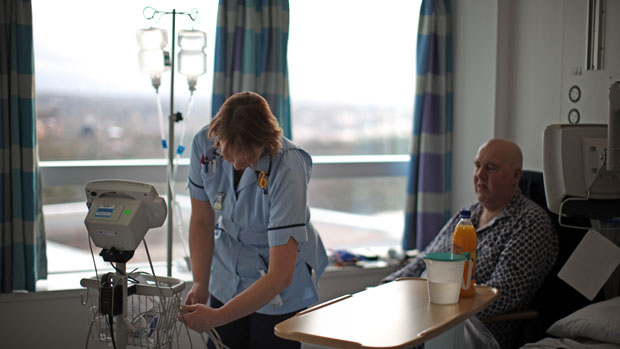NHS ‘ghost wards’: 1,400 beds unused due to lack of staff or funding
Labour calls for action over ‘scandal’ of ward closures amid bed shortages crisis

A free daily email with the biggest news stories of the day – and the best features from TheWeek.com
You are now subscribed
Your newsletter sign-up was successful
More than 1,400 NHS beds lie empty in 82 “ghost wards” in English hospitals, according to new figures released amid reports of reports of an ongoing bed shortages crisis.
The data, obtained under freedom of information laws by Labour’s shadow health secretary Jonathan Ashworth, shows that 1,429 hospital beds in NHS England trusts were unused as of September 2017 - almost three times more than the 502 recorded in 2013.
The ghost wards represent “the equivalent of two entire hospitals”, The Guardian reports, at a time when the health service has endured its “toughest winter for many years, during which many hospitals ran out of beds”.
The Week
Escape your echo chamber. Get the facts behind the news, plus analysis from multiple perspectives.

Sign up for The Week's Free Newsletters
From our morning news briefing to a weekly Good News Newsletter, get the best of The Week delivered directly to your inbox.
From our morning news briefing to a weekly Good News Newsletter, get the best of The Week delivered directly to your inbox.
The scale of the situation is “amazing”, Dr Nick Scriven, president of the Society for Acute Medicine, told the newspaper. Ward closures were “almost always” caused by a lack of money or staff, he said.
“In years and years of trying to balance books and achieve ‘efficiency’ savings, many hospitals will have taken the opportunities to shut clinical areas if they at all can,” Scriven added.
Ashworth said the closure of wards at a time of intense strain on NHS capacity was a “scandal”.
“We’ve just had doctors warning that the ‘winter crisis’ is likely to stretch into the summer and now our research reveals the extent to which beds that could be used to care for sick patients have been locked away,” he said.
A free daily email with the biggest news stories of the day – and the best features from TheWeek.com
“Ministers should be ensuring beds are used at this time of crisis for the NHS.”
A spokesperson for the Department of Health and Social Care said that Labour’s portrayal of “mothballed” wards was “misleading”, adding: “Trusts control the number of beds to meet demand and that’s why they were able to open 3,000 more at peak periods this winter.”
-
 Political cartoons for February 19
Political cartoons for February 19Cartoons Thursday’s political cartoons include a suspicious package, a piece of the cake, and more
-
 The Gallivant: style and charm steps from Camber Sands
The Gallivant: style and charm steps from Camber SandsThe Week Recommends Nestled behind the dunes, this luxury hotel is a great place to hunker down and get cosy
-
 The President’s Cake: ‘sweet tragedy’ about a little girl on a baking mission in Iraq
The President’s Cake: ‘sweet tragedy’ about a little girl on a baking mission in IraqThe Week Recommends Charming debut from Hasan Hadi is filled with ‘vivid characters’
-
 A real head scratcher: how scabies returned to the UK
A real head scratcher: how scabies returned to the UKThe Explainer The ‘Victorian-era’ condition is on the rise in the UK, and experts aren’t sure why
-
 How dangerous is the ‘K’ strain super-flu?
How dangerous is the ‘K’ strain super-flu?The Explainer Surge in cases of new variant H3N2 flu in UK and around the world
-
 The ‘menopause gold rush’
The ‘menopause gold rush’Under the Radar Women vulnerable to misinformation and marketing of ‘unregulated’ products
-
 How the care industry came to rely on migrant workers
How the care industry came to rely on migrant workersThe Explainer Government crackdown on recruiting workers abroad risks deepening care sector crisis, industry leaders warn
-
 Could medics' misgivings spell the end of the assisted dying bill?
Could medics' misgivings spell the end of the assisted dying bill?Today's Big Question The Royal College of Psychiatrists has identified 'serious concerns' with the landmark bill – and MPs are taking notice
-
 Washwood Heath: Birmingham's pioneering neighbourhood health service
Washwood Heath: Birmingham's pioneering neighbourhood health serviceIn the Spotlight NHS England chair says there is a 'really good argument this is the model for the future'
-
 The UK's first legal drug consumption room
The UK's first legal drug consumption roomThe Explainer 'Potentially transformative moment in UK drugs policy' as The Thistle opens in Glasgow
-
 How can the UK solve the adult social care crisis?
How can the UK solve the adult social care crisis?Today's Big Question New commission announced to turn our buckling care sector around: yet more delay or finally a way forward?